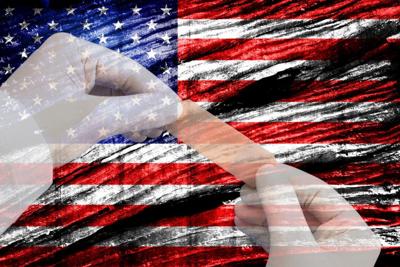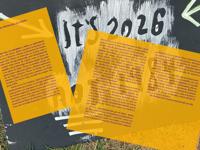
(Canva)
Wait. Hear me out.
As the executive branch of our federal government works to reframe our nation’s history, we should stop and take a close look—not only at what that means for the future, but also at how accurately our history was being portrayed to begin with. Some say the common portrayals are accurate, just incomplete. Maybe so. But much of what we do portray—even the “bad parts”—is watered down.
We, as a nation, refuse to truly face and reconcile with the darkest parts of our past. Most people agree that slavery happened and that it was evil. We have museum displays, school lessons and heartbreaking yet inspiring films about it. But we keep it at arm’s length—stripped of personal context and emotional truth. We talk about slave ships and chains cutting into wrists. We mention those who didn’t survive the journey, or who chose the cold uncertainty of the sea over the brutal certainty of enslavement.
What we rarely do is imagine what that felt like. We talk about it as a piece of history we “overcame,” but the truth is we haven’t overcome it at all—and we can’t until we’re able to imagine, even for a moment, that it was us in those chains. That it was us being whipped, sold, raped, dismembered and fed to dogs. I’m not talking about appropriating anyone’s pain. I’m talking about empathy.
We also can’t pretend that centuries somehow disconnect our present from our past. A direct line can be drawn from a random slave ship to the hardship of a single Black mother in Los Angeles. Another line runs from the Trail of Tears to the funeral of an Indigenous teen lost to addiction. And those same lines trace backward through every unhealed wound in this country’s history.
When we emerge from hard times, we tend to sweep everything under the rug and tell ourselves the future will be better. It’s like getting a deep cut and slapping a Band-Aid over it without cleaning it out first. The wound festers, infection sets in and instead of treating it, we just keep covering it up. Now the infection has entered the bloodstream—and it’s threatening the whole body.
When the Confederacy lost the Civil War and slavery was abolished, we allowed the same landowners to keep their wealth. We banned Confederate politicians from office but let their sons and friends take their place. Their money funded propaganda, political machines and organizations like the KKK. We allowed them to turn their symbols of hate into pieces of American identity—all without ever examining the atrocities they committed or the damage they continued to cause.
That’s only one part of the story.
Let’s talk about class.
After the Revolution, several rebellions broke out—uprisings of ordinary people crushed by economic hardship. And when the Civil War came, most of the Confederate soldiers who died weren’t fighting for their own interests at all; they were fighting to preserve the wealth and comfort of families who couldn’t care less about them.
Westward expansion and manifest destiny were driven by the same pattern. The wagon trains and handcart companies we romanticize were sent to clear the way—to displace the people already living on the land and make it safe for the wealthy to come in and exploit its resources.
This nation was built on the labor and exploitation of Black, Indigenous and Asian peoples, while poor whites were manipulated into defending the system that kept them down, too. The architects of that system were the same wealthy ruling class that still thrives today. If you think the present is disconnected from the darkness of the past, your eyes are closed—because very little has changed.
Wealthy megafarms still exploit immigrant labor.
Public policy and gerrymandering still keep Black and brown communities from thriving.
Lower and middle-class white Americans still join “roundup posses” to cage Brown people for a paycheck.
And all of it is still funded by the richest people on the planet.
When I said America has an America problem, I meant that our refusal to confront our history—to clean the wound—has allowed the infection to spread through every system that defines who we are. We keep retelling the same story in new centuries, pretending each time that this will be the one where things are different.
It won’t be.
Not unless we finally stop covering the wound and start cleaning it.
Healing begins when we stop pretending we were never wounded.











(0) comments
Welcome to the discussion.
Log In
Keep it Clean. Please avoid obscene, vulgar, lewd, racist or sexually-oriented language.
PLEASE TURN OFF YOUR CAPS LOCK.
Don't Threaten. Threats of harming another person will not be tolerated.
Be Truthful. Don't knowingly lie about anyone or anything.
Be Nice. No racism, sexism or any sort of -ism that is degrading to another person.
Be Proactive. Use the 'Report' link on each comment to let us know of abusive posts.
Share with Us. We'd love to hear eyewitness accounts, the history behind an article.